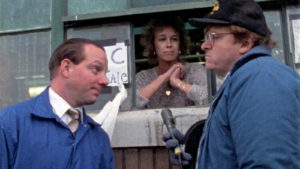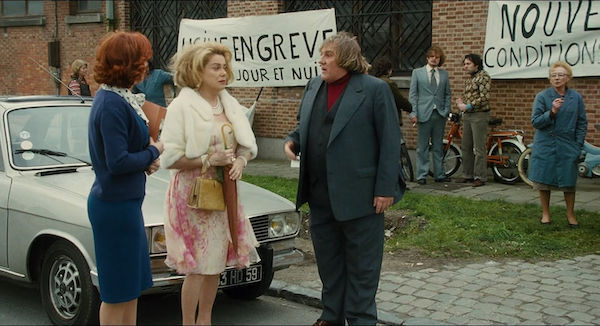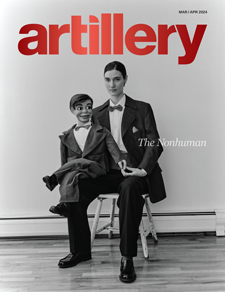Labor relations are a natural topic for film and documentaries. From the earliest days of cinema, there have been grouchy bosses. The most famous of these might be Michael Moore’s Roger and Me (1989). Strikes always provide a great context to explore the viewpoints of all of the concerned parties. The presence of a camera had more impact before it became part of a cell phone. When Barbara Kopple was filming the miner strikes for Harlan County USA (1976) she would keep the cameras running when she was out of film, because the cameras kept the violence in check.

Roger and Me.
People often use mines as a metaphor for awful jobs (“back to the salt mine” and “back to the coal mine”). Many movies focus on mining, both as fictional settings and documentary subjects. There are the straightforward dramas like The Molly Maguires (1970), Matewan (1987), Black Fury (1935), Salt of the Earth (1954), The Wages of Fear (1955) and Zorba the Greek (1964). Mine disasters are the subject of multiple horror films: Beneath (2013), Wicked Little Things (2006), My Bloody Valentine (1981), Abandoned Mine (2013).

The Office.
Labor dramas are often considered award bait and have won Oscars for Sally Field, Marlon Brando and Cher. They can also be wildly popular. The Office (2005–13) has become a touchstone for clueless bosses. In the movie 9 to 5 (1980) three women kidnap a misogynist boss and take charge. It is still among the top-grossing comedies ever. Night Shift (1982) is a comedy about a prostitution ring headquartered in a morgue. Another comedy set in the workplace is Tootsie (1982). Comedies set in the workplace can often address serious topics.
Labor has also been the topic of musicals. Paint Your Wagon (1969) portrays miners during the Gold Rush. Doris Day played a union steward in The Pajama Game (1957). The Disney musical Newsies! (1992) actually managed to portray the grim conditions in which the striking newsboys lived. Jacques Demy even set his musical Une Chambre en Ville (1982) in a worker’s strike in Nantes.

9 to 5.
With so many films about the topic of labor, it might be hard to pick the best portrayal of a tone-deaf clueless boss. My own go-to movie scene to illustrate this occurs in a French comedy called Potiche (2010). When the workers decide to strike for better wages and conditions in the boss’ business, while he is sidelined with heart attack, his trophy wife (potiche means “decorative object”) steps in to negotiate. The trophy wife of the title is Catherine Deneuve, who has actually aged out of the trophy category and has grimly accepted her husband’s mistress. Steeling herself to confront the workers, she is cautioned about overdressing. Instead, she fixes the person cautioning her with a hard stare and declares: “I must wear all of my jewelry.” When a clueless CEO has a press conference about worker relations/conditions, I always imagine them at their jewelry box, putting on every piece of jewelry they own.











0 Comments